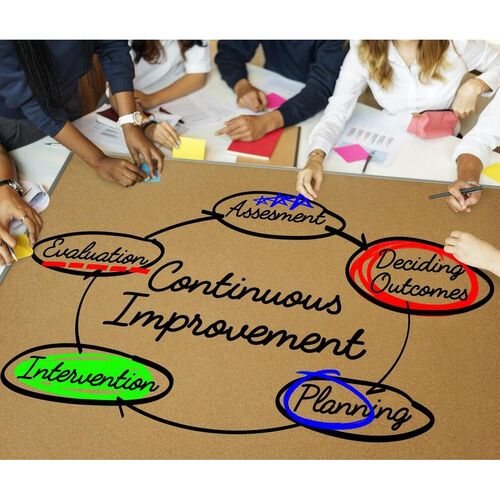Leadership & Management Apprenticeships
Improvement Technician Level 3 Apprenticeship
Improvement Technician Level 3 Apprenticeship
Overview
Improvement Technicians are responsible for delivery and coaching of improvement activity within an area of responsibility, often associated with Lean and Six Sigma methodologies. They can be found across all industry sectors and functions including automotive, banking, engineering, food products, IT, property, retail, telecoms.
Typically, Technicians work as a member of an operational team to resolve problems - preventing re-occurrence, engaging others in issues affecting them and to support the improvement of performance. Typical activities include:
- Engaging team members in the identification of improvement opportunities and relevant countermeasures and controls
- Initiating and facilitating improvement activities through to confirmed resolution
- Providing local expertise in business improvement methods and basic tools to team
The entry requirement for this apprenticeship will be decided by each employer. Employees without Level 2 English and Maths will need to achieve this level prior to taking the End Point Assessment.
After successful completion of this apprenticeship, the apprentice will gain the Level 3 Certificate in Improvement Techniques.
Improvement Technicians have the following Skills within the context of their own organisation:
- Compliance: Work in accordance with organisational controls and statutory regulations
- Communication: Share improvement progress through appropriate reporting
- Project management: Plan, manage and implement improvement activities. Identify and support management of risks. Develop the business case for improvement activity and implementation
- Change management: Engage through communications. Reinforce – positively and negatively. Effectively coach peers
- Principles and methods: Use a structured method and appropriate improvement tools engaging with subject matter experts to deliver business benefits
- Project selection and Scoping: Identify and scope improvement projects and establish clear measurable objectives
- Problem definition: Develop a problem/opportunity statement supported by validated data
- Voice of the customer: Apply techniques to identify customers, their requirements and translate these to metrics
- Process mapping & analysis: Apply process mapping tools to visualise processes, analyse process performance establishing key insights for performance improvement
- Lean tools: Apply techniques such as identification and removal of 8 wastes, 5S (Sort, Shine, Set, Standardise, Sustain), standard work, kaizen, visual displays and controls, error proofing, preventative maintenance
- Data acquisition for analysis: Develop data collection plan and validated measurement processes to understand performance
- Basic statistics & measures: Establish patterns and trends in data over time using tally, pie, run/trend and pareto charts
- Data analysis-statistical methods: Identify common and special cause variation
- Process capability & performance: Analyse product/process performance using good quality data
- Root cause analysis: Use cause and effect diagrams, technique of 5 whys and graphical analysis to understand and verify root causes
- Identification & prioritisation: Identify and prioritise improvement solutions
- Benchmarking: Recognise the value of sharing best practice
- Sustainability & control: Create control and reaction plans with detection measures, identify opportunities to embed changes to leverage benefit to the business.
There are a variety of job titles associated with the occupation, these include, but are not limited to: Business Improvement Co-ordinator, Continuous Improvement Executive, Process Technician, Operational Excellence/Lean Engineer, Lean Six Sigma Yellow belt and Quality Control Analyst.


